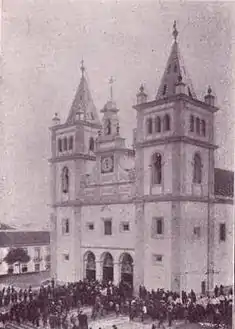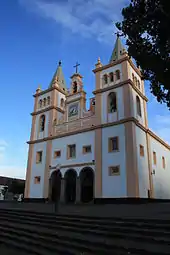Roman Catholic Diocese of Angra
The Roman Catholic diocese of Angra (Portuguese: Diocese de Angra, Latin: Dioecesis Angrensis) is a Roman Catholic diocese comprising the Portuguese archipelago of the Azores.[1] The see is located in Angra do Heroísmo, in the Terceira island. The current bishop is João Lavrador, who succeeded António de Sousa Braga in 2016.[2]
Roman Catholic Diocese of Angra Dioecesis Angrensis Diocese de Angra | |
|---|---|
 The Sé Cathedral of Angra, located on the island of Terceira[1] in the UNESCO-designated World Heritage city of Angra do Heroísmo | |
| Location | |
| Country | |
| Territory | |
| Ecclesiastical province | Lisbon |
| Metropolitan | Patriarchate of Lisbon |
| Coordinates | |
| Statistics | |
| Area | 2,243 km2 (866 sq mi) |
| Population - Total - Catholics (including non-members) | (as of 2012) 246,746 236,746 (95.9%) |
| Parishes | 164 |
| Information | |
| Denomination | Roman Catholic |
| Rite | Roman rite |
| Established | 5 November 1534 |
| Cathedral | Cathedral of the Holy Savior in Angra do Heroísmo |
| Patron saint | São Salvador do Mundo Blessed John Baptist Machado |
| Current leadership | |
| Pope | Francis |
| Bishop | João Lavrador |
| Metropolitan Archbishop | Manuel III |
| Map | |
 | |
| Website | |
| Website of the Diocese | |
History

The Azores, like all the islands and lands discovered during the Portuguese Age of Discoveries, began as jurisdictions of the Order of Christ, under the direction of the vicar of Tomar (Latin: vicarius nullius).
Upon the creation of the Bishopric of Funchal, in 1514, the communities of the Azores began to fall within the jurisdiction of the Bishop of Funchal. As the result of a petition by King John III of Portugal, Pope Clement VII created the Bishopric of São Miguel (São Salvador), but this patriarch died (31 January 1533) before a Papal bull was issued. The request to Clement VII included the creation of two new Dioceses, one for the islands of the Azores and the other for the settlements established along the coast of Western African (or its frontiers).
A papal bull entitled Æquum reputamus, was issued by Pope Paul III on 3 November 1534, that reorganized the religious jurisdiction of the nascent Empire of Portugal in the lines of the original petition (retroactively to the original Clement VII bull): based on John III's petition and creating the Diœcesis Angrensis for the Azores.[3] The bull was part of a group of decrees and concessions to the Portuguese clergy, beginning with the bull Dum diversas on 18 June 1452.[4]
The following year, Pope Paul III elevated the Bishopric of São Salvador, reclassified the Church of São Salvador as a cathedral and placed it under the suffragan of the Archbishop of Funchal.[5][6] In 1550, the diocese was transferred to the suffragan of the metropole of Lisbon. It was vacant from 1637 to 1671.[1]
Bishops of Angra
Since its creation, the Diocese of Angra has been governed by the following bishops:
- D. Agostinho Ribeiro (1534–1540)
- D. Rodrigo Pinheiro (1540–1552)
- D. Jorge de Santiago, O.P. (1552–1561)
- D. Manuel de Almada (1564–1567)
- D. Nuno Álvares Pereira (1568–1570)
- D. Gaspar de Faria (1571–1576)
- D. Pedro de Castilho (1578–1583)
- D. Manuel de Gouveia (1584–1596)
- D. Jerónimo Teixeira Cabral (1600–1612)
- D. Agostinho Ribeiro (1614–1621)
- D. Pedro da Costa (1623–1625)
- D. João Pimenta de Abreu (1626–1632)
- D. António da Ressurreição, O.P. (1635–1637)
- D. Lourenço de Castro, O.P. (1671–1678)
- D. João dos Prazeres, O.F.M. (1683–1685)
- D. Clemente Vieira, O.A.D. (1688–1692)
- D. António Vieira Leitão (1694–1714)
- D. João de Brito e Vasconcelos (1718)
- D. Manuel Álvares da Costa (1721–1733)
- D. Valério do Sacramento, O.F.M. (1738–1757)
- D. António Caetano da Rocha (1758–1772)
- D. João Marcelino dos Santos Homem Aparício (1774–1782)
- D. José da Avé-Maria Leite da Costa e Silva (1783–1799)
- D. José Pegado de Azevedo (1802–1812)
- D. Alexandre da Sagrada Família, O.F.M. (1816–1818)
- D. Manuel Nicolau de Almeida, O.C.D. (1820–1825)
- D. Estêvão de Jesus Maria, O.F.M. (1827–1870)
- D. João Maria Pereira de Amaral e Pimentel (1872–1889)
- D. Francisco Maria do Prado Lacerda (1889–1891)
- D. Francisco José Ribeiro Vieira e Brito (1892–1901)
- D. José Manuel de Carvalho (1902–1904)
- D. José Correia Cardoso Monteiro (1905–1910)
- D. Manuel Damasceno da Costa (1915–1922)
- D. António Augusto de Castro Meireles (1924–1928)
- D. Guilherme Augusto Inácio de Cunha Guimarães (1928–1957)
- D. Manuel Afonso de Carvalho (1957–1978)
- D. D. Aurélio Granada Escudeiro (1979–1996)
- D. António de Sousa Braga (1996–2016)
- D. Joao Evangelista Pimentel Lavrador (2016–present)
Diocese

The episcopal see remains a suffragan of the patriarch of Lisbon, Cardinal Manuel Clemente, and serves the entirety of the archipelago of the Azores.[2][6]
See also
- List of Roman Catholic dioceses in Portugal
- Roman Catholicism in Portugal
References
- Notes
- Herbermann, Charles, ed. (1907). . Catholic Encyclopedia. 1. New York: Robert Appleton Company.
- Cheney, David M. (4 March 2012). "Diocese of Angra". Kansas, United States. Retrieved 30 August 2012.
- Paiva Domingues, Gabriel de (1982). Oração de Andre de Resende Pronunciada No Colégio Das Artes em 1551 (in Portuguese). UC Biblioteca Geral 1.
- "Bulas relativas a Portugal" (in Portuguese).
- "Retratos dos bispos de Angra" (PDF) (in Portuguese). Angra do Heroímso (Azores), Portugal.
- Christensen, Michael (1907). "Angra". New Advent. New York, New York: Robert Appleton Company.
- Sources
- Battandier, Ann (1905), Pont. Cath. (in French), Paris, France, p. 213
- Werner (1890), Orbis Terr. Cath. (in German), Freiburg, Germany, p. 51
- Incarnat, Thomas A.B. (1757), Hist. Eccl. Lusitaniæ (in Portuguese), Coimbra, Portugal, p. 63
- New Advent, ed. (1907), "APA Citation", The Catholic Encyclopedia, New York, New York: Robert Appleton Company, retrieved 30 August 2012
- New Advent, ed. (1907), "Angra", The Catholic Encyclopedia, New York, New York: Robert Appleton Company, retrieved 30 August 2012
- Lafort, S.T.D., Remy (1 March 1907), John Cardinal Farley, Archbishop of New York (ed.), Ecclesiastical approbation. Nihil Obstat, New York, New York: Censor. Imprimatur